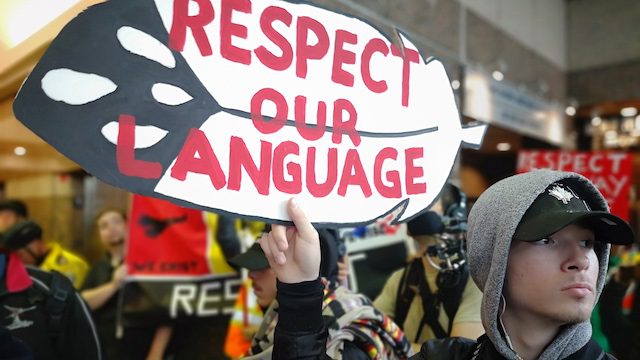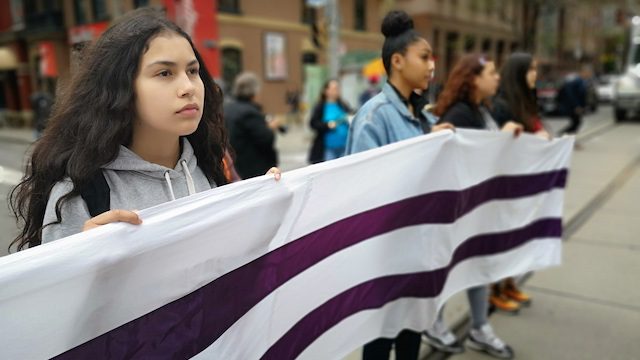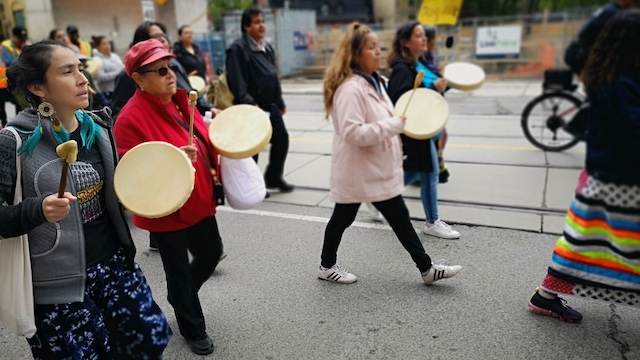
First Nations peoples and allies marched in the streets of Toronto Wednesday to condemn what they say is the Trudeau government’s attempt to domesticate and terminate inherent Indigenous rights.
More than 100 people shut down Yonge and Dundas, a major intersection in the city’s downtown core, where they held a round dace and demanded that treaties between First Nations and the Crown be respected.
They said the Liberal government’s efforts to legislate Indigenous rights related to language, child welfare, and policy reforms around land rights and self-government threaten inherent rights that existed before Canada became a country and to which the Crown promised to respect in historic treaties.
Canada is “trying to unilaterally pass pieces of legislation and policy that will change our relationship forever,” Association of Iroquois and Allied Indians Deputy Grand Chief Gordon Peters told a crowd gathered before the march.
“So our responsibility is to be able to say to the government you cannot do that, you do not have our consent to do that.”
(Proposed language and child welfare legislation were the target of marchers Wednesday in Toronto. Photo: Justin Brake/APTN)
Currently, several pieces of legislation related to Indigenous rights are before the Senate committee, including Bill C-91, An Act Respecting Indigenous Languages, C-92, An Act respecting First Nations, Inuit and Métis children, youth and families, and C-262, the United Nations Declaration on the Rights of Indigenous Peoples Act.
Peters said that while Canada is consulting with the Assembly of First Nations (AFN) on the legislative changes, the federal government has not upheld the honour of the Crown by engaging with the proper rights and title holders, which is the people themselves.
“AFN cannot give consent. AFN is an organization,” he said. “Consent has to come from the people in the grassroots, our communities, and our people.”
Sara Mainville, a lawyer with OKT Law who hails from Couchiching First Nation, spoke to demonstrators ahead of the march.
The former chief is recognized for her understanding of Anishinaabe law and inherent Indigenous jurisdiction.
“Your rights are to continue as a society in your own way,” she said Wednesday. “The treaty is about responsibilities and obligations to respect the other treaty partner, and that respect has been forgotten for so long.
“We were offered something, we were offered Section 35,” she said, referring to the repatriation of Canada’s constitution in 1982. “And the Queen’s court said that Canada would now be responsible for our treaties, and they would uphold the Queen’s honour. And that has not happened.”
(Marchers carry a two row wampum banner through downtown Toronto. Photo: Justin Brake/APTN)
Mainville said rather than focus on legislating Indigenous rights and laws under Canadian common law, First Nations should instead focus on “forming our own Indigenous, our own Anishinaabe, our own Haudenosaunee, our own institutions.”
Speakers at Wednesday’s rally emphasized that while some of the Trudeau government’s proposed legislative and policy changes sound good, they threaten inherent rights because they define those rights under Canadian law.
Instead, if Canada and the Crown were honouring the treaties, they said, Indigenous Peoples’ rights would be regarded as inherent and as belonging to sovereign nations — therefore would not need to be defined under Canadian law.
“We’re marching in the streets today because Canada is trying to pass legislation without our consent, and it’s contrary to our treaty relationship,” Peters told APTN during the march, minutes before demonstrators temporarily occupied a regional office of Indigenous Services Canada.
Youth led the march through the streets, with women drumming behind them.
Dozens chanted “Whose land is it? Our land!” and “Honour the treaties!”
(Marchers shut down Yonge and Dundas in downtown Toronto with a round dance. Photo: Justin Brake/APTN)
On their way to Indigenous services they temporarily shut down one of the city’s busiest intersections, Yonge and Dundas, where they held a round dance.
Men and boys sang on the big drum, while others led chants, shouting “Power to the people!”
One woman with a megaphone yelled, “Our women are strong! Our babies are going to be even stronger! They’re going to grow up and they’re going to take over what we’re doing right now. We’re raising peaceful warriors. Honour the treaties!”
Powerful moments in Toronto, where First Nations ppl allies have shut down Yonge and Dundas with a round dance. Led by the women. Men and boys on the drum. Girls holding the two row wampum flag, fists raised. They’re all now chanting “Power to the People!” pic.twitter.com/esBjAnxhln
— Justin Brake () May 29, 2019
Five girls held a white and purple-striped flag representing the Two Row Wampum Treaty, the 1613 treaty between Iroquois Nations and settlers.
Peters called the Two Row Wampum “the grandfather of our treaties, and [of] our treaty relationships.
“When we agreed to live together in the river of life, we agreed in that process that…we would make sure we didn’t pass laws on each other, we wouldn’t try to change each other’s lives, but we would try to find a way to exist together peacefully so that we could all live together and benefit from the land,” he explained.
“That’s the fundamental process that we’re still pushing for, because all of our treaties say the same thing…that we were meant to be able to coexist together. It doesn’t mean that Canada’s position, which is that once you sign treaties you extinguish all your lands—you’d have to be absolutely crazy to believe that you were going to extinguish your lands by entering into a treaty. None of that is true. It’s Canada’s policy. Simple as that.”
People took to the streets of Toronto Wednesday to protest what they say is Canada’s attempt to terminate inherent Indigenous rights.
Association of Iroquois and Allied Indians Deputy Grand Chief Gordon Peters explains the significance of the original Haudenosaunee Treaty. pic.twitter.com/wQqqxd5h1o
— APTN National News () May 29, 2019
Caldwell First Nation Chief Mary Duckworth, who marched with demonstrators Wednesday, said the state of Canada’s relationship with First Nations is evident.
“We can see it on the land. The land is sick. The animals are sick. The people are sick. And things are changing and it’s getting serious.”
She said she’s “asking for change, asking for recognition, asking for our treaty rights to be honoured,” adding the youth are watching and will continue the legacy of protecting their inherent and treaty rights.
“This is only going to grow, only going to get bigger, and we’re only getting stronger,” she said.
“So I’m hoping that Canada will listen to what we have to say today as it pertains to our language, our children, our customs, our culture. Because there are more coming behind us There is another generation that is stronger and faster. So let’s start today to mend those fences and heal those wounds.”












